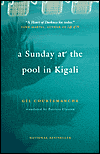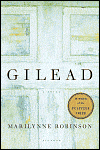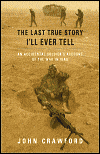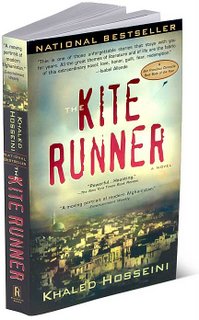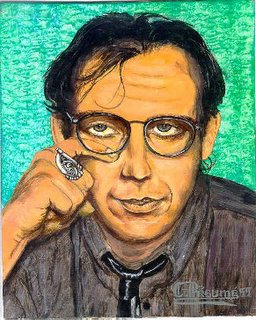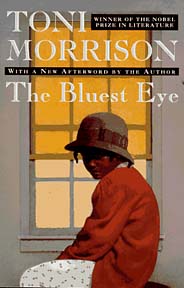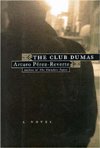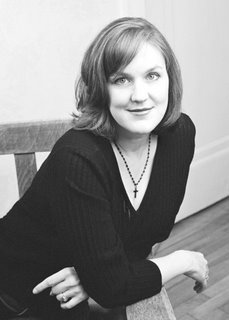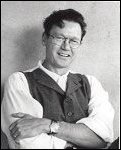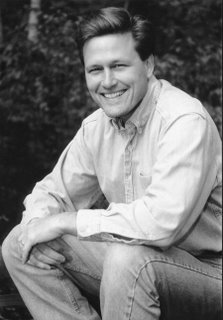Interview with Christopher Moore
Our review of Lamb by Christopher Moore went well - Kevin, Cathie, Val, A.C., Sean, Alycia, and myself were all there to throw in to the discussion and everyone gave it a 4.0 except Sean who gave it a 2.5 and Kevin who gave it a 4.75. Below is the interview I promised I would post. It sheds some light on Moore's personal views of the life of JC. Enjoy!
Interview on Lamb - Independent Bookstores
by Gavin J. Grant
Christopher Moore's hilarious new novel, Lamb, is a March/April 2002 Book Sense 76 pick. Lamb, subtitled The Gospel According to Biff, Christ's Childhood Pal, is a comical tale of the early years of one Joshua, more commonly known to us as Jesus Christ. Moore noted the lack of detail in the stories about Jesus' early life, and decided that he would provide the record of one of the possible course of events.
Moore is the author of a number of comic novels. His first, Practical Demonkeeping, established his place as a new voice on the scene, and since then, in novels like Island of the Sequined Love Nuns and The Lust Lizard of Melancholy Cove, he has continued to amuse and amaze readers. Moore's been on tour for the book on and off for the last couple of weeks, so we interviewed him by email.
BookSense.com: Writing Lamb must have been like walking a tightrope. There are so many people you could insult with a book like this; how did you strike that balance?
Christopher Moore: I used the same guide I always use: "Nothing mean-spirited." I was not writing an attack book, but I have no problem pointing out hypocrisy. Since the book was set in the 1st Century, most of the hypocrites weren't going to be bothered by being called on it today. Mostly I just had to cut my instances of Joshua (Jesus) using the "F" word. For some reason, people have a hard time getting over that.
What's the response been?
People like the book a lot. I haven't had a single negative reaction from a religious point of view. Some people don't like my sense of humor, but that's to be expected. As far as a reaction from the clergy or the laity, nothing but good stuff. I've had a number of ministers at my signings, all with kind things to say about Lamb.
Are you particularly religious?
Nope.
Did you travel a lot to research this book?
I just spent a couple of weeks in Israel touring historical sites. Most of the research for this book was academic, that is, I read a ton of books on theology, archeology, history, and sociology.
Did you go to Kabul? And, if so, when were you there and what was it like?
No, I just picked Kabul off of a map of the silk road of the time. The reason I picked it for use in the book was the map showed these incredible canyons in the mountains above Kabul where Balthasar could have a fortress to hide in. At the time I envisioned a cliff-face fortress like at Petra in Jordan, or what we see in southern Turkey. Needless to say, I was more than surprised when, a year later, Kabul became a place in the news.
Okay, dreadful question: where did this book come from? Watching "The Life of Brian"? Partaking overmuch of Gideon Bibles in hotels while on tour?
Actually, the initial inspiration came from a scene in Bulgakov's The Master and Margarita, of the trial of Jesus from the point of view of Pontius Pilate, who was having I migraine at the time. A few months later I saw the PBS Frontline special called "From Jesus to Christ," and I came up with the concept for telling the "missing years" of Christ's life from the point of view of an unknown best friend. It's funny because that's what I do.
Reading Lamb is a lot of fun. Do you think it will encourage people to take a positive look at religion?
Actually, I think it may, especially since it focuses on the commonality of the major religions. That said, I'd be much happier if the book encourages people to take a more positive view of humanity than religion does; but even that seems pretentiously ambitious.
Did you read the gospels (the official and unofficial ones)? Was there anything that just jumped out that had to be in your book?
I read the canonized gospels many, many times, and actually had to go through them to make a credible chronology of events for the story, since the gospels don't agree with one another. Quite a few things jumped out at me as having to be in the book, especially those very few things that give clues to the characters of the Apostles: When Jesus first meets Nathaniel, who says, "What good can come out of Nazareth," then seconds later recognizes Jesus as the Savior. And the scene where a woman named Mary anoints Jesus' feet with oil and Judas goes berserk because of the money she spent on the oil. It goes on like that. I used almost every scene that revealed some sort of character trait in each of the Apostles. Many of them are only named and don't really appear to do anything in the gospels.
Are you tempted to write the story from anyone else's point of view?
Actually, I don't think I would want to write this story again, but I might be tempted to someday tell another Bible story. The story of Paul would be interesting in the New Testament, and I don't think many people really know it. (I don't, really.)
Have you ever been asked or hired to write a history of any organization?
Nope. I had to write a mission statement for a company I worked for once, but that's as close as I came. They went out of business in about a month, so I guess the mission wasn't that well-defined.
You've often been compared to Douglas Adams, (probably because there are only a few genuine funny writers around), have you read his books?
Yes. Douglas Adams was a great inspiration to me. I remember when I was writing my first book, Practical Demonkeeping, I said to a friend that I wanted to do for horror what Douglas Adams had done for science fiction. I'm not sure if I did exactly that, but that doesn't diminish the inspiration and admiration. I never met Adams, but I was stunned when he passed away.
When you first started writing, were there any models for the books you wanted to write?
Well, as above, there was Hitchhiker's Guide. Other than that, I felt as if I was writing perhaps a Stephen King novel that focused on humor. I learned how to write suspense from King's early books. As for the narrative voice, my model was Cannery Row by John Steinbeck. When I get lost in my work, I always go back to Steinbeck's comic work.
When you're writing, how do you make sure something is funny? Do you read aloud what you've written?
No, I don't. And it embarrasses me to attempt to. I also don't give it to other people. I just have to trust my instincts until the book is finished. So far, so good, because I don't cut much. Usually if I think it's funny, it is.
Are you working on anything now?
Yes, I'm working on a comic novel about whale researchers called Fluke. It should be out some time next summer.
What are you reading?
Right now I'm reading a play by Tom Stoppard, a novel called Sewer, Gas and Electric by Matt Ruff, which I should have read years ago, and I'm rereading all of Vonnegut. (Plus the voluminous research stuff for the new book.)
Do you have a favorite bookshop?
That's a tough question. I really like Moe's Books[1] in Berkeley -- it's a truly amazing used bookstore (four floors) and I usually leave with a couple of shopping bags full of books. I also like Cody's Books in Berkeley for shopping. (I sometimes take book-buying vacations to Berkeley, which is four hours from where I live. I'll eat pizza by the slice, buy books, then retire to a hotel to read.) There are some great bookstores around the country that I love , but that I've never had the time to browse through because I've only been there on book tour. I really like Powell's[2] in Portland, The Tattered Cover in Denver, for biggies, and Esmerelda Books[3] in Del Mar, CA, and the Book Cafe[4] in Capitola, CA for smaller shops. You can't buy books on book tour because of the luggage problem. It's like a teasing torture to see all those cool bookstores without being able to assault the stacks.
If you worked in a bookstore, what books would be on your Staff Picks shelf?
Funny novels that I don't think that many people know about: Hugh Laurie's The Gun Seller, Steve Kluger's The Last Days of Summer, John Welter's Night of the Avenging Blowfish, everything by Chuck Paluhniuk (Fight Club, Choke), Neal Stephenson's Snow Crash, my books, and of course, the comic novels of Steinbeck.
